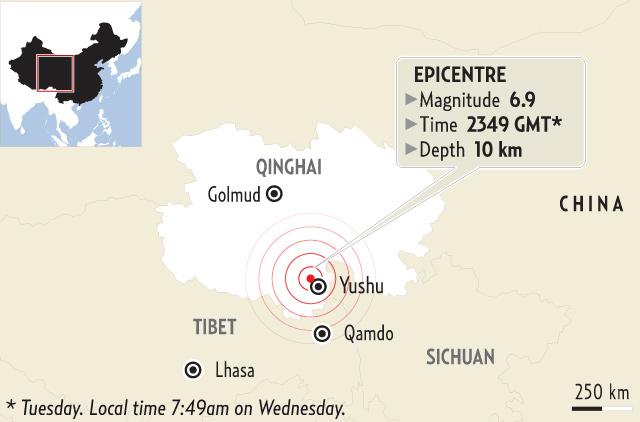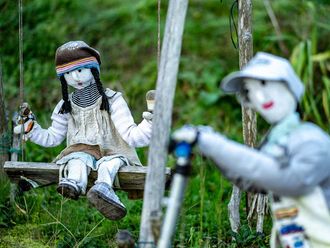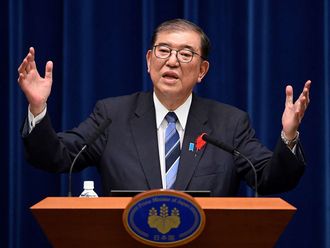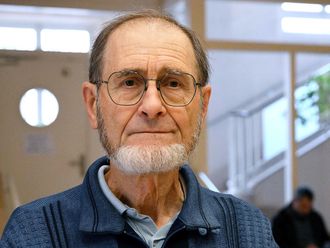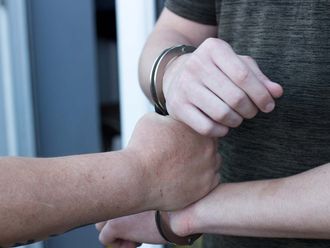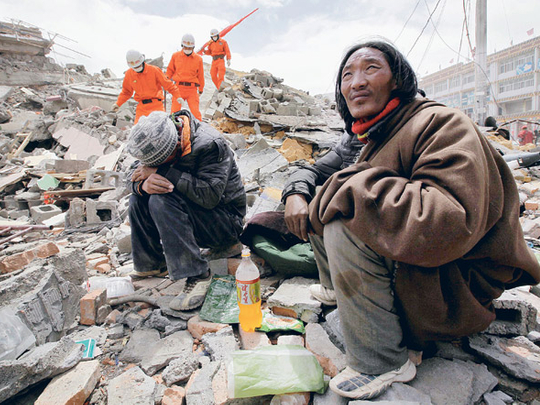
Yushu, China: The death toll from Wednesday's earthquake in China's remote and mountainous Yushu county has climbed to 617, even as convoys of trucks yesterday carried in supplies and tents for survivors braving the cold.
The death toll is expected to rise further, in freezing temperatures that leave little hope for those still trapped under the rubble of homes, schools and monasteries in the ruined county seat, Jiegu, known in Tibetan as Gyegu.
In pictures: Earthquakes rattle northwestern China
Tents have sprung up around a statue of a warrior on a horse in windswept Gyegu, where most of the region's 100,000 people live. Monks dug at the rubble with shovels as soldiers handed out rice and gruel to shaken survivors.
The sports stadium is now a makeshift hospital, but inadequate for the number of people with broken bones and other injuries. Dozens of injured and distraught Tibetans lay outside, their broken limbs crudely splinted with wooden lathes.
The main 6.9 quake was centred in the mountains that divide Qinghai province from the Tibet Autonomous Region. The Tibetan plateau is regularly shaken by earthquakes, though casualties are usually minimal because so few people live there.
Nearly 10,000 people have been injured in the latest quake, almost 1,000 of them severely, the official Xinhua news agency said, citing a spokesman with the rescue headquarters in the ethnically Tibetan town. Hundreds are still unaccounted for.
Food and medicines
Buses carrying rescue workers and trucks filled with food and medicine rumbled all night through sleet, sandstorms and fierce icy winds along the 1,000km-long highway separating Yushu from the Qinghai provincial capital, Xining.
Tibetan Buddhist monks have turned out in force to help rescue efforts, although the town's main Buddhist monastery lay in ruins on a nearby hillside.
"We were the first to help when the earthquake came. We monks are here to help the people just as much as the government," said one monk, digging through rubble in the main square.
Tibetan Buddhists have often been at odds with China's ruling Communist Party, which is wary of the ties between the monasteries and Tibetan exiles.
That tension could complicate rescue efforts by non-government organisations, some worry.
"They say the army is helping us here but look, it's all up to us," said Tashi, a volunteer outside the stadium who said he was trying to transfer patients to outside hospitals.
For many Chinese, images from Yushu recall the devastating May 2008 earthquake in Sichuan province, which killed 80,000.
Volunteers and donors traded information on Twitter accounts, while Tibetans and Chinese living in Beijing organised an impromptu fund-raiser near the Chinese capital's largest Tibetan Buddhist temple.
In the Sichuan quake, the widespread collapse of school buildings when many other surrounding buildings remained standing, caused anger and accusations of corruption. In the Yushu quake, 66 students and 10 teachers were confirmed dead at three schools, including a collapsed vocational school, Xinhua said.
Experience from that rescue effort was evident in the speedy deployment of material after the quake.
President Hu Jintao and Premier Wen Jiabao have called for all-out efforts in rescue attempts, and sent Vice-Premier Hui Liangyu to Qinghai to oversee relief work. However, China declined an offer of help from Japan, that government's spokesman said.
Isolation worries
Many locals said they were happy to see help arrive so quickly, but they also worried that their area's isolation means reconstruction will take a long time.
Survivors slept beneath quilts collected from the cinderblocks and bricks of their former homes, or set up tents on a flat area just outside town.
Some spent the night in cars for warmth, state TV said.


